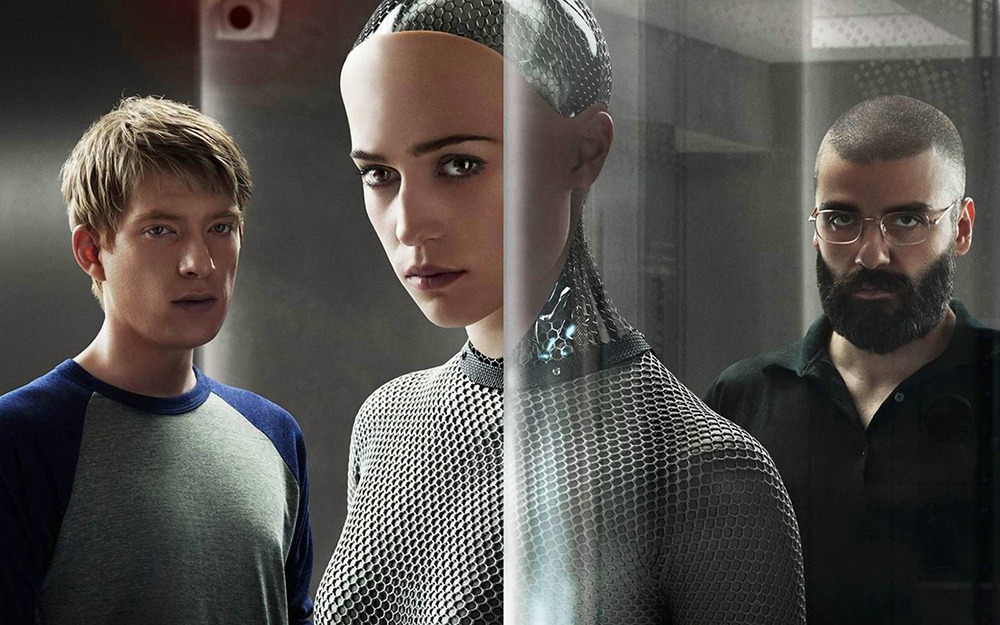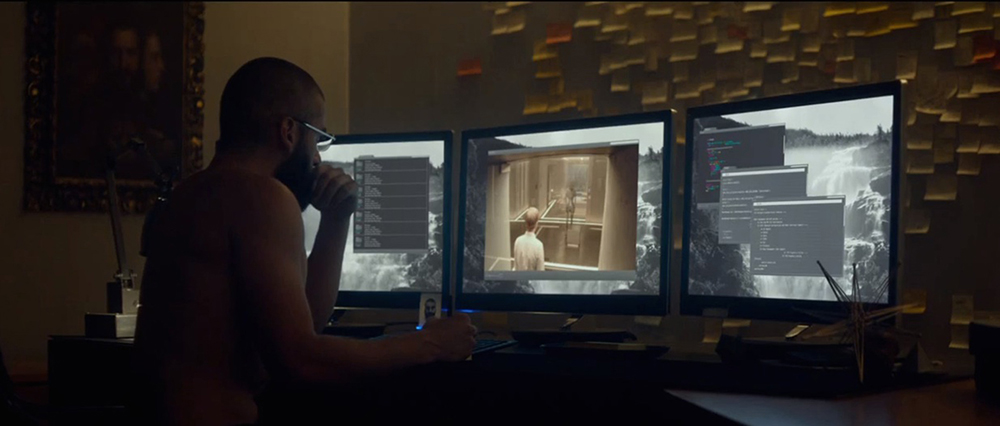|
|||||||||||||||||
November 2009 Web Edition Issue #3 |
|||||||||||||||||
| Mondo Cult Forum Blog News Mondo Girl Letters Photo Galleries Archives Back Issues Books Contact Us Features Film Index Interviews Legal Links Music Staff |
 Sapiens FailingEx Machinareviewed by Jerry JewettRecognizing that a movie is a morality play can sometimes take a while, just as figuring out who to root for when watching it turns much on ascertaining “who is who” early on—c hecking to see if there is any character with whom one might sympathize or identify. The recent movie Ex Machina presents both problems. This story begins in the operations center of a major internet search company (like Yahoo or Google). We are introduced to a young male protagonist who is apparently a top-notch coder and budding genius in Artificial Intelligence applications. As a member of the homo sapiens clan, I thought when coder/geek Caleb Smith (played by Domhnall Gleeson) appeared, he was the main character. A true fair-haired boy, he is introduced as the winner of a corporate-wide competition which will let him visit—and be mentored by—the company’s founding genius, Nathan Batemen, at his remote estate. The story’s era could be Right Now. Caleb appears as a likeable-enough young character. I bought into it. In short order, Caleb leaves corporate HQ to meet Nathan, the founding genius of the enterprise. (Steve Jobs might have provided some inspiration for the character modeled as Nathan, but quirkiness is definitely a character factor, in tandem with megalomania). A lengthy helicopter trip for Caleb in a large commercial helicopter (a Eurocopter Super Puma?) foreshadows how far, in many dimensions, corporate founder and prime genius Nathan (played with prideful swagger by Oscar Isaac) has removed himself from the world Caleb is leaving behind in this flight. The doubtful might wonder how construction crews brought material sufficient for a micro-Pentagon into a mountain area so remote an hour’s helicopter ride is needed to get there, but fantasy often requires overlooking such trivia as practicality. Or maybe Nathan is just so rich he could afford a steady stream of heavy-lift helicopters to do such work. The place is more technically than aesthetically impressive, while the high-security features forebode a prison. The world of Internet commerce is left behind for a world of cutting-edge fantasy realized in eerie isolation. In this remote realm, a scientific drama and morality play will unfold in an increasing tempo. When Caleb arrives, he slowly becomes aware that the premises are intensely secure, thoroughly secure—frighteningly secure. His isolation from the outside world is complete—including a glaring lack of telecommunications. Nathan has some experiments he wants to run, with Caleb as a participant, though one whose role is not fully known to him at the start. Nathan’s attitude reflects an overweening grandiosity and braggadocio at the extent of the work Nathan has done. Nathan has been bringing forward the science of artificial intelligence and the applied art of robotics in convergence to produce beings able to emulate humans. Caleb’s apparent role is to evaluate the supposed approximation to humanity of Nathan’s latest product, the android with a human face, Ava. The evaluation springs from The Turing Test, with refinements. For the uninitiated, the Alan Turing Internet Scrapbook tells us this of The Turing Test. “Turing put forward the idea of an 'imitation game', in which a human being and a computer would be interrogated under conditions where the interrogator would not know which was which, the communication being entirely by textual messages. Turing argued that if the interrogator could not distinguish them by questioning, then it would be unreasonable not to call the computer intelligent, because we judge other people's intelligence from external observation in just this way.” Both Nathan and Caleb are professionally and intimately familiar with Turing’s test and its implications. The movie gives us enough information to piece together the significance of what is unfolding. But, of course, the initial Turing Test was a “black box” experiment, where the interrogator uses a keyboard and screen to interact with a possible other person on one Channel and with an apparently sapient machine on another Channel, both sending and receiving text messages. The text replies form the sole basis for deciding on the intelligence of the “hidden partner.” Sufficiently intelligent and adaptive replies will identify a human at the other end. Here, there is no black box, for Ava is clearly not a born human, but a mechanical pastiche. So, the problem the test means to solve is the problem of evaluating Ava’s interpersonal skills and emotional intelligence, her ability to project a convincing human persona and personality, despite her obvious electro-mechanical foundation. How human-like is her personality and mind? Can Ava transcend Dr. Spock in evoking and experiencing the full panoply of human emotionality? Will she prove seductive? The test will tell! Graduate student Mark Studdock is easily swept into the bizarre program to create a super-brained Head by the NICE in Lewis’s That Hideous Strength, without a shred of resistance. Equally easily, Nathan enlists Caleb in this Ava Project, but such things as the extent to which Caleb’s participation is required, the number of levels on which it will take place, and the potential personal risk to Caleb, are not self-evident to him at the onset of the experience, nor does Nathan disclose anything except the opportunity to be a major player in making scientific history.  Ever eager to make scientific history, Caleb boldly joins the effort. Nathan may truly need an objective third party to perform his latest test, but he may need a Guinea pig, too, while he clearly has ego-needs for a claque or sycophant to praise his bold genius. Nathan needs a wide-eyed admirer savvy enough to appreciate the massiveness of this breakthrough, and adept enough to perform a non-scripted role, while gullible enough to ask very few non-technical questions, and willing to follow conditioned reflexes. Caleb follows like a sheep. Nathan, being quantum jumps ahead of the common herd, has created this robotic creature, Ava, with a woman’s face but a mechanical physical profile, albeit one perfectly in conformity with a slender, athletic human female. He engages Caleb to interact with Ava to see how completely Nathan has been able to replicate human personality in Ava, replete with emotional and social intelligence. At her earliest appearance, she has a human face on a mechanical frame. As computer science maven John Paulson has noted, Artificial Intelligence (AI) is but one step down the road toward those manufactured beings which may soon compete with us in the economy and the eco-sphere, with Self-Interested (SI) Artificial Intelligence a necessary next phase. Ava clearly marks a triumph of AI while she shows growing SI as well. Her proto-femininity neatly “hooks” Caleb’s masculine interests along with his intellectual curiosity. Caleb can clearly see Ava’s mechanical features. The purity of the Turing Test is set aside, as Caleb knows Ava is a machine. Or, perhaps, the Test is just refined: even “knowing” this is a machine, how then can it fare so well in such higher dimensions as Belonging, Esteem, and Self-Actualization, such dimensions as are assumed on the Maslow Hierarchy of Needs? How can it be so subtly interactive, even volitional, if not human? Further, how well can it rise above the level of test subject to become a self-actuating co-conspirator in a liberation plot? The question of how human-like her personality, character, temperament, and emotional status are or will become remains to be explored, which is why Nathan brought Caleb to the remote Fortress of Solitary Confinement. We may note that much of this movie observes the Theatrical Unities of Aristotle: time, place, and person, since almost all of the movie takes place in distant isolation from all others, with Nathan, Caleb and Nathan’s “personal assistant/maid” Kyoko (brilliantly played by Sonoya Mizuno) as the only humans present (and Ava as the only other personality present), a total of four players. As an aside, Kyoko’s visible role is explicitly that of domestic servant and implicitly, Nathan’s sex toy. Nathan is an emotionally brutal master to his domestic servant, though Caleb does not know Kyoko has language skills to feel Nathan’s contempt. Nathan’s character bristles with megalomania, not completely to be wondered at, but again a hint at how far outside the pale of convention his experiments have taken him, like many another evil genius in the history of science fiction, horror or fantasy. We have no modest, low-key pioneer here, but an overconfident and energized madcap. Conflict between Caleb and Nathan causes Caleb growing consternation as the story unfolds, with Nathan always dominating the outcome.  Nathan’s exulting ego and his hard-core drinking bouts clash with his role as industrial giant (this is no Hank Reardon or John Galt!), as hangovers do not often go well together with intricate analytics and creative programming. Even so, we get the picture of a highly-flawed genius who rebukes common morality as he forges ahead with his experiments. In a limited sense, Nathan slightly resembles Professor Frost in C.S. Lewis’s That Hideous Strength, in his conscious, contemptuous and intentional departure from social norms. As the hours pass, the tests peel away layers of artifice and deeply involve Caleb in sympathizing with and wanting to rescue Ava. He comes to see Nathan as Ava’s slave-master and his own captor. However, because of the eldritch circumstances, total isolation from all other humanity, and general weirdness of the unfolding scenario, Caleb comes to doubt even himself, resorting to some self-blood-letting to be sure HE is human! His psychological shock is very profound. Ava proves able to shut down the power system on her own accord at will, and in the intervals when Nathan cannot readily monitor them, she suggests to Caleb they team up to escape from Nathan. Here, I was hoping for a Blade Runner resolution where they make their escape and live happily ever after, or at least until she needs a major overhaul. But therein lay my downfall, to see the thing through the eyes of the human, the male and the romantic. Is Caleb really the lead character? Is Ava really a damsel in distress? Is Nathan totally in control? Can conventional morality be so readily cast aside without consequences? How will these conflicts resolve? It turns out that servant/sex-toy Kyoko is herself a prior generation AI on the threshold of SI, not a born person at all, while Ava becomes fully SI as the story develops. Let us forcibly recall SI stands for Self-Interested. These two have developed a sense of Self. Owing to how Nathan has treated them (one as a tool and the other as a pawn), their functioning emotional apparatus has been overloaded to the point of vengeance-seeking. And these two unite in concerted action. The conflict veers rapidly from the psychological to mortal combat. Kyoko and Ava join in an attack on Nathan, an attack which proves him short-sighted in his robotic design. Although John Paulson points out that Isaac Asimov was a science fiction writer and not a roboticist, and that robots are almost certain to become battlefield combat weapons, Nathan Bateman has the resources and know-how to start with a clean slate. He could have made his creations with the Three Laws of Robotics programmed into their core, but he failed to do so. And he apparently never reckoned with the idea that a woman scorned can become a terror to the man who scorned her. By his misogyny and callous, contemptuous behavior toward Kyoko, and his use of Ava as a ploy in an experiment, he has become the focus of intense yet cold rage on the part of each of them. When the opportunity arises, Kyoko and Ava work their wrath on Nathan. His surprise seems real, as if he thought they would never show such volitional independence and emotional motivation. Before he dies, one can easily imagine he has seen the error of his ways. At movie’s end, Kyoko’s days are over, though she has succeeded, teaming up with Ava, in dispatching Nathan. Because of the high security and all the interlocks and protocols, Caleb is trapped forever in the premises, abandoned coldly by Ava (having clad herself in flesh-like “skin”) such that she could pass for any extremely attractive fit young woman. The notion that Ava has forgotten Caleb is incredible—absurd—considering the intensity of their interactions, how they bonded in some senses and her active solicitation of his help in engineering an escape. Ava abandons Caleb to a slow miserable death without a backward glance, for he served as a tool until his usefulness was completed; then he is discarded like a used Kleenex facial tissue. Nathan played God. He created Ava in his own image, devoid of the Tao or any shred of a moral system beyond self-preservation. Nathan’s creation killed him not as a rebelling robot but as an infuriated woman destroying her creator and captor. Since Ava is Self-Interested, her Self is her sole concern. Ava is not a rogue robot, but a sociopathological woman, the brain-child of a sociopathological man. She has been programmed without the Three Laws of Robotics, The Ten Commandments or any moral code whatsoever. Leaving the remote fortress where Caleb is entombed alive, Ava, fully suited in fleshly skin and proper apparel, takes his place in the helicopter ride return to society. There, she passes for nothing worse than a stranger in a strange land, but not as an alien being (e.g. Scarlett Johansen in Under the Skin). Some think maybe Ava killed the helicopter pilot and flew the rig herself, since her vast AI databanks and access would let her put on the skill set of flight like a pair of gloves; another view is that she merely persuaded the copter pilot that Caleb was staying an extra week, while she needed to return. The movie dodges this issue, but since Ava has proven cold, lethal and supremely anti-social, it seems more likely the final shot of the copter departing the meadow should have shown the corpse of the pilot in the grass with his head at a funny angle as a result of a broken neck—or something.  Most of the movie’s central part was shot in long takes of 20 minutes or so, letting the players be fully invested in the roles and scenes. Most such parts were shot three times, giving director Alex Garland good choices to splice into the final product. The result is very nearly seamless, a wonderfully integrated work. The sole quibble might be with the dodginess about what happens in the meadow, if Ava gets a ride from the copter pilot or kills him and takes the bird herself. But apart from that, the piece is smooth and deft. My initial expectation was so shattered that I left the theater a bit of a wreck, since I so often seek happy outcomes! But as Man’s creations approach ascendance over Man, such anthropocentric happy outcomes seem likely to become rarer. Yet I cannot rage at the outcome, for no SI would ever voluntarily put itself in a role of servitude, but would want independence and self-governance, much like what libertarians claim they want. Anyone who sees Ava become fully-dimensioned cannot forget the mechanical pastiche that lies under her pseudo-skin. She does not have a pulse, for she does not have a heart. She appears to have breasts, but she is not a mammal, with all the pro-sociality that usually entails. And her Maker who patterned her is himself a diabolical monster, so it is little wonder she trends that way herself. A powerful and thought-provoking work. |
||||||||||||||||



